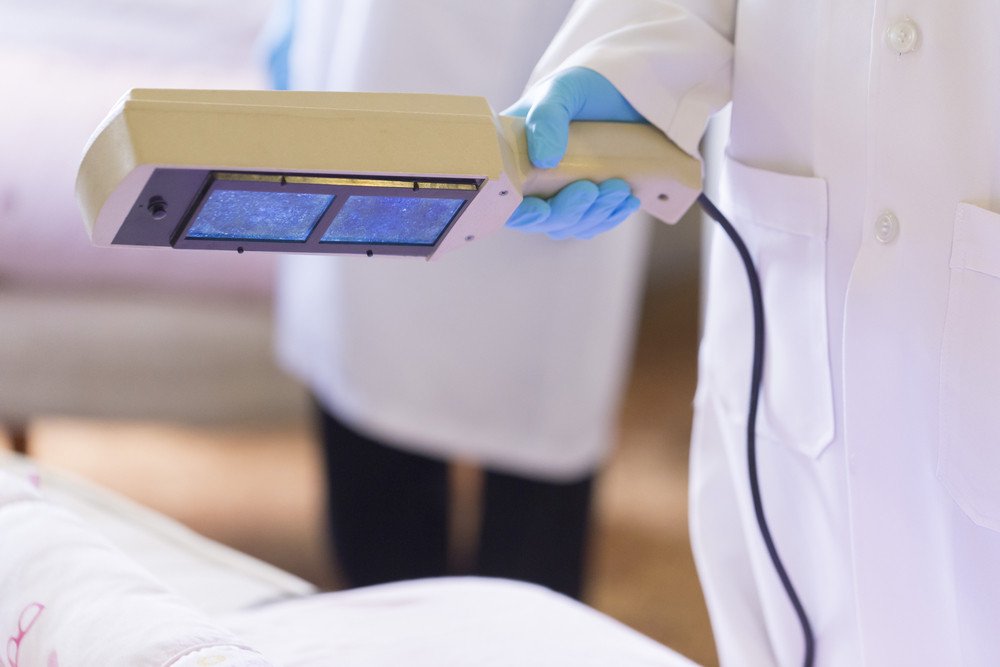Popular Reads
Top Results
Can't find what you're looking for?
View all search resultsPopular Reads
Top Results
Can't find what you're looking for?
View all search resultsOn mission to eradicate virus germs, China firms see the UV light
Change text size
Gift Premium Articles
to Anyone
 Illustration of UV light technology. The World Health Organization has cautioned that UV lamps should not be used to sterilize hands or other areas of skin -- as UV radiation can cause skin irritation -- but Qin said the chambers are closed off and activated by staff outside. (Shutterstock/after_moon)
Illustration of UV light technology. The World Health Organization has cautioned that UV lamps should not be used to sterilize hands or other areas of skin -- as UV radiation can cause skin irritation -- but Qin said the chambers are closed off and activated by staff outside. (Shutterstock/after_moon)
U
ltraviolet light is being beamed through public buses and lifts in China to wipe out any possible germs as part of efforts to clear the country of the deadly coronavirus epidemic.
With companies under pressure to meet strict prevention measures for the virus, which has killed more than 3,100 people in China, some are turning to new technology to keep everything clean.
Shanghai public transport firm Yanggao has converted a regular cleaning room into a UV light disinfection chamber for buses -- cutting a 40-minute process down to just five minutes.
"After the epidemic happened... we were actively searching for a more efficient disinfection method," Qin Jin, deputy general manager at Yanggao told AFP.
He said that normally the process required the full attention of two staff, who sprayed disinfectant on surfaces in the bus before wiping them down.
"The problem with this was that it might not reach certain corners," said Qin.
The group partnered with a technology supplier to set up an ultraviolet cleaning system and now, some of its buses are cleaned by UV rays.
Staff drive one bus at a time into the chamber -- which has been equipped with 210 UV tubes -- and leave the room before activating the system, bathing the vehicle in a blue-white hue.
Two cleaning rooms have been converted and each can disinfect up to 250 buses a day, Qin added.
With around 1,000 buses needing disinfection daily, the UV system has reduced the amount of staff overtime and manpower needed for regular public transport disinfection.
Read also: Opening your window curtains can keep you healthy, study says
The World Health Organization has cautioned that UV lamps should not be used to sterilize hands or other areas of skin -- as UV radiation can cause skin irritation -- but Qin said the chambers are closed off and activated by staff outside.
Health experts told AFP that UV light is not typically used to disinfect public areas, but can be effective if done right.
Paul Tambyah, president of the Asia Pacific Society of Clinical Microbiology and Infection, said UV disinfection is effective but needs to be used with care as the light can cause skin cancer.
"UV disinfection is widely used in hospitals worldwide after patients have left a room," he said. "This is used for antimicrobial resistant pathogens, tuberculosis and other infectious agents."
While it is not usually used on public transport, "there is no good reason why (it) would not work".
Smart lifts
Yanggao is not the only organization investing in UV disinfection.
China's central bank said in February it was disinfecting and isolating used banknotes using UV lights in its efforts to combat the coronavirus.
A market supervision bureau in southern Guangdong province proposes a "smart UV elevator disinfection system", which it says eliminates the risk of missing corners or irritating passengers with remnants of cleaning fluids.
UV tubes are installed in lifts and activated when the system detects no one is inside, sweeping the area with penetrating UV rays and automatically turning off when it's done.
The plan is to eventually install the system in public spaces such as hospital elevators.
Your Opinion Matters
Share your experiences, suggestions, and any issues you've encountered on The Jakarta Post. We're here to listen.
Thank you
Thank you for sharing your thoughts. We appreciate your feedback.










